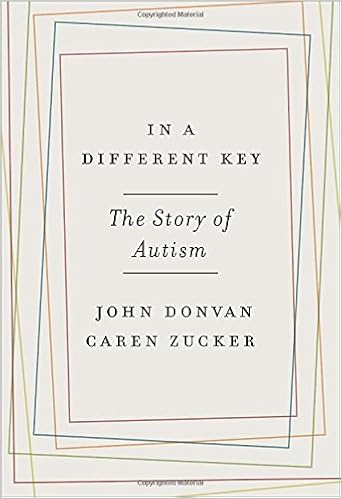
In a Different Key: The Story of
Autism by John Donovan and Caren Zucker
Shutting
people up in a mental hospital with very little social interaction was one way
medical professionals dealt with certain cases a long time, but things have
certainly changed. In their new book, In
a Different Key: The Story of Autism, authors John Donovan and Caren Zucker tell
the story of autism through its first case to today’s perception of the
condition. With anecdotal information, scientific
breakthroughs, and the personal stories of those like Donald, Donovan and Zucker
do a wonderful job at telling the story of autism.
In
the first chapter, we get a picture of Donald, the first known case of
autism. Growing up in Forest,
Mississippi, Donald ‘could not tolerate even the slightest of changes to his physical
surroundings.’ The hardest thing for his
mother was his emotional indifference to her, including when she hugged and
kissed Donald. In chapter 3 we find that
Beamon and Mary turned to Dr. Leo Kanner, a doctor who took the straitjackets
off those patients who really didn’t them but also studied cases like Donald’s. To prep for his visit, the family was asked
to write up an observation journal about Donald, upon which Beamon wrote with a
keen observational eye. Chapter 4
relates that Dr. Kanner’s “discovery” of autism was not something that came over
night but that was based on at least 4 years after meeting Donald for the first
time. Kanner soon began to notice that sameness and aloneness were hallmarks of
autistic children, in each case there were strong examples of these themes.
Although
it took time for Donald to adapt in the public school system, Mary noticed that
he was fully engaged in a reading lesson and followed correctly what was asked
of the teacher. His responses to questions were not full or very descriptive,
but his development of language began to grow.
By 1944 Donald was writing letters, telling his mother about a red rose
and almost spelling all the words correctly.
At 14 Donald became very ill but this did not stop his learning process
nor do it stop his family and class from loving him well.
This
is a remarkable book about the early years of autism on through today’s
understanding of autism.
Thanks
to Blogging for Books for the copy of this book in exchange for an honest review.
Comments
Post a Comment